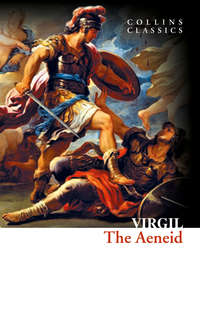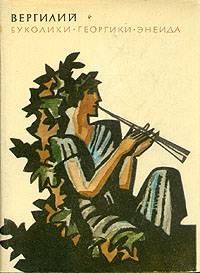 полная версия
полная версияThe Aeneid of Virgil
Scarce had he ended; Aeneas, son of Anchises, and trusty Achates gazed with steadfast face, and, sad at heart, were revolving inly many a labour, had not the Cytherean sent a sign from the clear sky. For suddenly a flash and peal comes quivering from heaven, and all seemed in a moment to totter, and the Tyrrhene trumpet-blast to roar along the sky. They look up; again and yet again the heavy crash re-echoes. They see in the serene space of sky armour gleam red through a cloud in the clear air, and ring clashing out. The others stood in amaze; but the Trojan hero knew the sound for the promise of his goddess mother; then he speaks: 'Ask not, O friend, ask not in any wise what fortune this presage announces; it is I who am summoned of heaven. This sign the goddess who bore me foretold she would send if war assailed, and would bring through the air to my succour armour from Vulcan's hands. . . . Ah, what slaughter awaits the wretched Laurentines! what a price, O Turnus, wilt thou pay me! how many shields and helmets and brave bodies of men shalt thou, Lord Tiber, roll under thy waves! Let them call for armed array and break the league!'
These words uttered, he rises from the high seat, and first wakes with fresh fire the slumbering altars of Hercules, and gladly draws nigh his tutelar god of yesternight and the small deities of the household. Alike Evander, and alike the men of Troy, offer up, as is right, choice sheep of two years old. Thereafter he goes to the ships and revisits his crew, of whose company he chooses the foremost in valour to attend him to war; the rest glide down the water and float idly with the descending stream, to come with news to Ascanius of his father's state. They give horses to the Teucrians who seek the fields of Tyrrhenia; a chosen one is brought for Aeneas, housed in a tawny lion skin that glitters with claws of gold. Rumour flies suddenly, spreading over the little town, that they ride in haste to the courts of the Tyrrhene king. Mothers redouble their prayers in terror, as fear treads closer on peril and the likeness of the War God looms larger in sight. Then Evander, clasping the hand of his departing son, clings to him weeping inconsolably, and speaks thus:
'Oh, if Jupiter would restore me the years that are past, as I was when, close under Praeneste, I cut down their foremost ranks and burned the piled shields of the conquered! Then this right hand sent King Erulus down to hell, though to him at his birth his mother Feronia (awful to tell) had given three lives and triple arms to wield; thrice must he be laid low in death; yet then this hand took all his lives and as often stripped him of his arms. Never should I now, O son, be severed from thy dear embrace; never had the insolent sword of Mezentius on my borders dealt so many cruel deaths, widowed the city of so many citizens. But you, O heavenly powers, and thou, Jupiter, Lord and Governor of Heaven, have compassion, I pray, on the Arcadian king, and hear a father's prayers. If your deity and decrees keep my Pallas safe for me, if I live that I may see him and meet him yet, I pray for life; any toil soever I have patience to endure. But if, O Fortune, thou threatenest some dread calamity, now, ah now, may I break off a cruel life, while anxiety still wavers and expectation is in doubt, while thou, dear boy, my one last delight, art yet clasped in my embrace; let no bitterer message wound mine ear.' These words the father poured forth at the final parting; his servants bore him swooning within.
And now the cavalry had issued from the open gates, Aeneas and trusty Achates among the foremost, then other of the Trojan princes, Pallas conspicuous amid the column in scarf and inlaid armour; like the Morning Star, when, newly washed in the ocean wave, he shews his holy face in heaven, and melts the darkness away. Fearful mothers stand on the walls and follow with their eyes the cloud of dust and the squadrons gleaming in brass. They, where the goal of their way lies nearest, bear through the brushwood in armed array. Forming in column, they advance noisily, and the horse hoof shakes the crumbling plain with four-footed trampling. There is a high grove by the cold river of Caere, widely revered in ancestral awe; sheltering hills shut it in all about and girdle the woodland with their dark firs. Rumour is that the old Pelasgians, who once long ago held the Latin borders, consecrated the grove and its festal day to Silvanus, god of the tilth and flock. Not far from it Tarchon and his Tyrrhenians were encamped in a protected place; and now from the hill-top the tents of all their army might be seen outspread on the fields. Lord Aeneas and his chosen warriors draw hither and refresh their weary horses and limbs.
But Venus the white goddess drew nigh, bearing her gifts through the clouds of heaven; and when she saw her son withdrawn far apart in the valley's recess by the cold river, cast herself in his way, and addressed him thus: 'Behold perfected the presents of my husband's promised craftsmanship: so shalt thou not shun, O my child, soon to challenge the haughty Laurentines or fiery Turnus to battle.' The Cytherean spoke, and sought her son's embrace, and laid the armour glittering under an oak over against him. He, rejoicing in the magnificence of the goddess' gift, cannot have his fill of turning his eyes over it piece by piece, and admires and handles between his arms the helmet, dread with plumes and spouting flame, as when a blue cloud takes fire in the sunbeams and gleams afar; then the smooth greaves of electrum and refined gold, the spear, and the shield's ineffable design. There the Lord of Fire had fashioned the story of Italy and the triumphs of the Romans, not witless of prophecy or ignorant of the age to be; there all the race of Ascanius' future seed, and their wars fought one by one. Likewise had he fashioned the she-wolf couched after the birth in the green cave of Mars; round her teats the twin boys hung playing, and fearlessly mouthed their foster-mother; she, with round neck bent back, stroked them by turns and shaped their bodies with her tongue. Thereto not far from this he had set Rome and the lawless rape of the Sabines in the concourse of the theatre when the great Circensian games were celebrated, and a fresh war suddenly arising between the people of Romulus and aged Tatius and austere Cures. Next these same kings laid down their mutual strife and stood armed before Jove's altar with cup in hand, and joined treaty over a slain sow. Not far from there four-horse chariots driven apart had torn Mettus asunder (but thou, O Alban, shouldst have kept by thy words!), and Tullus tore the flesh of the liar through the forest, his splashed blood dripping from the briars. Therewithal Porsena commanded to admit the exiled Tarquin, and held the city in the grasp of a strong blockade; the Aeneadae rushed on the sword for liberty. Him thou couldst espy like one who chafes and like one who threatens, because Cocles dared to tear down the bridge, and Cloelia broke her bonds and swam the river. Highest of all Manlius, warder of the Tarpeian fortress, stood with the temple behind him and held the high Capitoline; and the thatch of Romulus' palace stood rough and fresh. And here the silver goose, fluttering in the gilded colonnades, cried that the Gauls were there on the threshold. The Gauls were there among the brushwood, hard on the fortress, secure in the darkness and the dower of shadowy night. Their clustering locks are of gold, and of gold their attire; their striped cloaks glitter, and their milk-white necks are entwined with gold. Two Alpine pikes sparkle in the hand of each, and long shields guard their bodies. Here he had embossed the dancing Salii and the naked Luperci, the crests wreathed in wool, and the sacred shields that fell from heaven; in cushioned cars the virtuous matrons led on their rites through the city. Far hence he adds the habitations of hell also, the high gates of Dis and the dooms of guilt; and thee, O Catiline, clinging on the beetling rock, and shuddering at the faces of the Furies; and far apart the good, and Cato delivering them statutes. Amidst it all flows wide the likeness of the swelling sea, wrought in gold, though the foam surged gray upon blue water; and round about dolphins, in shining silver, swept the seas with their tails in circle as they cleft the tide. In the centre were visible the brazen war-fleets of Actium; thou mightest see all Leucate swarm in embattled array, and the waves gleam with gold. Here Caesar Augustus, leading Italy to battle with Fathers and People, with gods of household and of state, stands on the lofty stern; prosperous flames jet round his brow, and his ancestral star dawns overhead. Elsewhere Agrippa, with favouring winds and gods, proudly leads on his column; on his brows glitters the prow-girt naval crown, the haughty emblazonment of the war. Here Antonius with barbarian aid and motley arms, from the conquered nations of the Dawn and the shore of the southern sea, carries with him Egypt and the Eastern forces of utmost Bactra, and the shameful Egyptian woman goes as his consort. All at once rush on, and the whole ocean is torn into foam by straining oars and triple-pointed prows. They steer to sea; one might think that the Cyclades were uptorn and floated on the main, or that lofty mountains clashed with mountains, so mightily do their crews urge on the turreted ships. Flaming tow and the winged steel of darts shower thickly from their hands; the fields of ocean redden with fresh slaughter. Midmost the Queen calls on her squadron with the timbrel of her country, nor yet casts back a glance on the twin snakes behind her. Howling Anubis, and gods monstrous and multitudinous, level their arms against Neptune and Venus and against Minerva; Mars rages amid the havoc, graven in iron, and the Fatal Sisters hang aloft, and Discord strides rejoicing with garment rent, and Bellona attends her with blood-stained scourge. Looking thereon, Actian Apollo above drew his bow; with the terror of it all Egypt and India, every Arab and Sabaean, turned back in flight. The Queen herself seemed to call the winds and spread her sails, and even now let her sheets run slack. Her the Lord of Fire had fashioned amid the carnage, wan with the shadow of death, borne along by the waves and the north-west wind; and over against her the vast bulk of mourning Nile, opening out his folds and calling with all his raiment the conquered people into his blue lap and the coverture of his streams. But Caesar rode into the city of Rome in triple triumph, and dedicated his vowed offering to the gods to stand for ever, three hundred stately shrines all about the city. The streets were loud with gladness and games and shouting. In all the temples was a band of matrons, in all were altars, and before the altars slain steers strewed the ground. Himself he sits on the snowy threshold of Phoebus the bright, reviews the gifts of the nations and ranges them on the haughty doors. The conquered tribes move in long line, diverse as in tongue, so in fashion of dress and armour. Here Mulciber had designed the Nomad race and the ungirt Africans, here the Leleges and Carians and archer Gelonians. Euphrates went by now with smoother waves, and the Morini utmost of men, and the hornèd Rhine, the untamed Dahae, and Araxes chafing under his bridge.
These things he admires on the shield of Vulcan, his mother's gift, and rejoicing in the portraiture of unknown history, lifts on his shoulder the destined glories of his children.
BOOK NINTH
THE SIEGE OF THE TROJAN CAMP
And while thus things pass far in the distance, Juno daughter of Saturn sent Iris down the sky to gallant Turnus, then haply seated in his forefather Pilumnus' holy forest dell. To him the child of Thaumas spoke thus with roseate lips:
'Turnus, what no god had dared promise to thy prayer, behold, is brought unasked by the circling day. Aeneas hath quitted town and comrades and fleet to seek Evander's throne and Palatine dwelling-place. Nor is it enough; he hath pierced to Corythus' utmost cities, and is mustering in arms a troop of Lydian rustics. Why hesitate? now, now is the time to call for chariot and horses. Break through all hindrance and seize the bewildered camp.'
She spoke, and rose into the sky on poised wings, and flashed under the clouds in a long flying bow. He knew her, and lifting either hand to heaven, with this cry pursued her flight: 'Iris, grace of the sky, who hath driven thee down the clouds to me and borne thee to earth? Whence is this sudden sheen of weather? I see the sky parting asunder, and the wandering stars in the firmament. I follow the high omen, whoso thou art that callest me to arms.' And with these words he drew nigh the wave, and caught up water from its brimming eddy, making many prayers to the gods and burdening the air with vows.
And now all the army was advancing on the open plain, rich in horses, rich in raiment of broidered gold. Messapus rules the foremost ranks, the sons of Tyrrheus the rear. Turnus commands the centre: even as Ganges rising high in silence when his seven streams are still, or the rich flood of Nile when he ebbs from the plains, and is now sunk into his channel. On this the Teucrians descry a sudden cloud of dark dust gathering, and the blackness rising on the plain. Caïcus raises a cry from the mound in front: 'What mass of misty gloom, O citizens, is rolling hitherward? to arms in haste! serve out weapons, climb the walls. The enemy approaches, ho!' With mighty clamour the Teucrians pour in through all the gates and fill the works. For so at his departure Aeneas the great captain had enjoined; were aught to chance meanwhile, they should not venture to range their line or trust the plain, but keep their camp and the safety of the entrenched walls. So, though shame and wrath beckon them on to battle, they yet bar the gates and do his bidding, and await the foe armed and in shelter of the towers. Turnus, who had flown forward in advance of his tardy column, comes up suddenly to the town with a train of twenty chosen cavalry, borne on a Thracian horse dappled with white, and covered by a golden helmet with scarlet plume. 'Who will be with me, my men, to be first on the foe? See!' he cries; and sends a javelin spinning into the air to open battle, and advances towering on the plain. His comrades take up the cry, and follow with dreadful din, wondering at the Teucrians' coward hearts, that they issue not on even field nor face them in arms, but keep in shelter of the camp. Hither and thither he rides furiously, tracing the walls, and seeking entrance where way is none. And as a wolf prowling about some crowded sheepfold, when, beaten sore of winds and rains, he howls at the pens by midnight; safe beneath their mothers the lambs keep bleating on; he, savage and insatiate, rages in anger against the flock he cannot reach, tired by the long-gathering madness for food, and the throat unslaked with blood: even so the Rutulian, as he gazes on the walled camp, kindles in anger, and indignation is hot in his iron frame. By what means may he essay entrance? by what passage hurl the imprisoned Trojans from the rampart and fling them on the plain? Close under the flanking camp lay the fleet, fenced about with mounds and the waters of the river; it he attacks, and calls for fire to his exultant comrades, and eagerly catches a blazing pine-torch in his hand. Then indeed they press on, quickened by Turnus' presence, and all the band arm them with black faggots. The hearth-fires are plundered; the smoky brand trails a resinous glare, and the Fire-god sends clouds of glowing ashes upward.
What god, O Muses, guarded the Trojans from the rage of the fire? who repelled the fierce flame from their ships? Tell it; ancient is the assurance thereof, but the fame everlasting. What time Aeneas began to shape his fleet on Phrygian Ida, and prepared to seek the high seas, the Berecyntian, they say, the very Mother of gods, spoke to high Jove in these words: 'Grant, O son, to my prayer, what her dearness claims who bore thee and laid Olympus under thy feet. My pine forest beloved of me these many years, my grove was on the mountain's crown, whither men bore my holy things, dim with dusky pine and pillared maples. These, when he required a fleet, I gave gladly to the Dardanian; now fear wrings me with sharp distress. Relieve my terrors, and grant a mother's prayers such power that they may yield to no stress of voyaging or of stormy gust: be birth on our hills their avail.'
Thus her son in answer, who wheels the starry worlds: 'O mother, whither callest thou fate? or what dost thou seek for these of thine? May hulls have the right of immortality that were fashioned by mortal hand? and may Aeneas traverse perils secure in insecurity? To what god is power so great given? Nay, but when, their duty done, they shall lie at last in their Ausonian haven, from all that have outgone the waves and borne their Dardanian captain to the fields of Laurentum, will I take their mortal body, and bid them be goddesses of the mighty deep, even as Doto the Nereïd and Galatea, when they cut the sea that falls away from their breasts in foam.' He ended; and by his brother's Stygian streams, by the banks of the pitchy black-boiling chasm he nodded confirmation, and shook all Olympus with his nod.
So the promised day was come, and the destinies had fulfilled their due time, when Turnus' injury stirred the Mother to ward the brands from her holy ships. First then a strange light flashed on all eyes, and a great glory from the Dawn seemed to dart over the sky, with the choirs of Ida; then an awful voice fell through air, filling the Trojan and Rutulian ranks: 'Disquiet not yourselves, O Teucrians, to guard ships of mine, neither arm your hands: sooner shall Turnus burn the seas than these holy pines. You, go free; go, goddesses of the sea; the Mother bids it.' And immediately each ship breaks the bond that held it, as with dipping prows they plunge like dolphins deep into the water: from it again (O wonderful and strange!) they rise with maidens' faces in like number, and bear out to sea.
The Rutulians stood dumb: Messapus himself is terror-stricken among his disordered cavalry; even the stream of Tiber pauses with hoarse murmur, and recoils from sea. But bold Turnus fails not a whit in confidence; nay, he raises their courage with words, nay, he chides them: 'On the Trojans are these portents aimed; Jupiter himself hath bereft them of their wonted succour; nor do they abide Rutulian sword and fire. So are the seas pathless for the Teucrians, nor is there any hope in flight; they have lost half their world. And we hold the land: in all their thousands the nations of Italy are under arms. In no wise am I dismayed by those divine oracles of doom the Phrygians insolently advance. Fate and Venus are satisfied, in that the Trojans have touched our fruitful Ausonian fields. I too have my fate in reply to theirs, to put utterly to the sword the guilty nation who have robbed me of my bride; not the sons of Atreus alone are touched by that pain, nor may Mycenae only rise in arms. But to have perished once is enough! To have sinned once should have been enough, in all but utter hatred of the whole of womankind. Trust in the sundering rampart, and the hindrance of their trenches, so little between them and death, gives these their courage: yet have they not seen Troy town, the work of Neptune's hand, sink into fire? But you, my chosen, who of you makes ready to breach their palisade at the sword's point, and join my attack on their fluttered camp? I have no need of Vulcanian arms, of a thousand ships, to meet the Teucrians. All Etruria may join on with them in alliance: nor let them fear the darkness, and the cowardly theft of their Palladium, and the guards cut down on the fortress height. Nor will we hide ourselves unseen in a horse's belly; in daylight and unconcealed are we resolved to girdle their walls with flame. Not with Grecians will I make them think they have to do, nor a Pelasgic force kept off till the tenth year by Hector. Now, since the better part of day is spent, for what remains refresh your bodies, glad that we have done so well, and expect the order of battle.'
Meanwhile charge is given to Messapus to blockade the gates with pickets of sentries, and encircle the works with watchfires. Twice seven are chosen to guard the walls with Rutulian soldiery; but each leads an hundred men, crimson-plumed and sparkling in gold. They spread themselves about and keep alternate watch, and, lying along the grass, drink deep and set brazen bowls atilt. The fires glow, and the sentinels spend the night awake in games. . . .
Down on this the Trojans look forth from the rampart, as they hold the height in arms; withal in fearful haste they try the gates and lay gangways from bastion to bastion, and bring up missiles. Mnestheus and valiant Serestus speed the work, whom lord Aeneas appointed, should misfortune call, to be rulers of the people and governors of the state. All their battalions, sharing the lot of peril, keep watch along the walls, and take alternate charge of all that requires defence.
On guard at the gate was Nisus son of Hyrtacus, most valiant in arms, whom Ida the huntress had sent in Aeneas' company with fleet javelin and light arrows; and by his side Euryalus, fairest of all the Aeneadae and the wearers of Trojan arms, showing on his unshaven boy's face the first bloom of youth. These two were one in affection, and charged in battle together; now likewise their common guard kept the gate. Nisus cries: 'Lend the gods this fervour to the soul, Euryalus? or does fatal passion become a proper god to each? Long ere now my soul is restless to begin some great deed of arms, and quiet peace delights it not. Thou seest how confident in fortune the Rutulians stand. Their lights glimmer far apart; buried in drunken sleep they have sunk to rest; silence stretches all about. Learn then what doubt, what purpose, now rises in my spirit. People and senate, they all cry that Aeneas be summoned, and men be sent to carry him tidings. If they promise what I ask in thy name—for to me the glory of the deed is enough—methinks I can find beneath yonder hillock a path to the walls of Pallanteum town.'
Euryalus stood fixed, struck through with high ambition, and therewith speaks thus to his fervid friend: 'Dost thou shun me then, Nisus, to share thy company in highest deeds? shall I send thee alone into so great perils? Not thus did my warrior father Opheltes rear and nurture me amid the Argive terror and the agony of Troy, nor thus have I borne myself by thy side while following noble Aeneas to his utmost fate. Here is a spirit, yes here, that scorns the light of day, that deems lightly bought at a life's price that honour to which thou dost aspire.'
To this Nisus: 'Assuredly I had no such fear of thee; no, nor could I; so may great Jupiter, or whoso looks on earth with equal eyes, restore me to thee triumphant. But if haply—as thou seest often and often in so forlorn a hope—if haply chance or deity sweep me to adverse doom, I would have thee survive; thine age is worthier to live. Be there one to commit me duly to earth, rescued or ransomed from the battlefield: or, if fortune deny that, to pay me far away the rites of funeral and the grace of a tomb. Neither would I bring such pain on thy poor mother, she who singly of many matrons hath dared to follow her boy to the end, and slights great Acestes' city.'
And he: 'In vain dost thou string idle reasons; nor does my purpose yield or change its place so soon. Let us make haste.' He speaks, and rouses the watch; they come up, and relieve the guard; quitting their post, he and Nisus stride on to seek the prince.
The rest of living things over all lands were soothing their cares in sleep, and their hearts forgot their pain; the foremost Trojan captains, a chosen band, held council of state upon the kingdom; what should they do, or who would now be their messenger to Aeneas? They stand, leaning on their long spears and grasping their shields, in mid level of the camp. Then Nisus and Euryalus together pray with quick urgency to be given audience; their matter is weighty and will be worth the delay. Iülus at once heard their hurried plea, and bade Nisus speak. Thereon the son of Hyrtacus: 'Hear, O people of Aeneas, with favourable mind, nor regard our years in what we offer. Sunk in sleep and wine, the Rutulians are silent; we have stealthily spied the open ground that lies in the path through the gate next the sea. The line of fires is broken, and their smoke rises darkly upwards. If you allow us to use the chance towards seeking Aeneas in Pallanteum town, you will soon descry us here at hand with the spoils of the great slaughter we have dealt. Nor shall we miss the way we go; up the dim valleys we have seen the skirts of the town, and learned all the river in continual hunting.'








